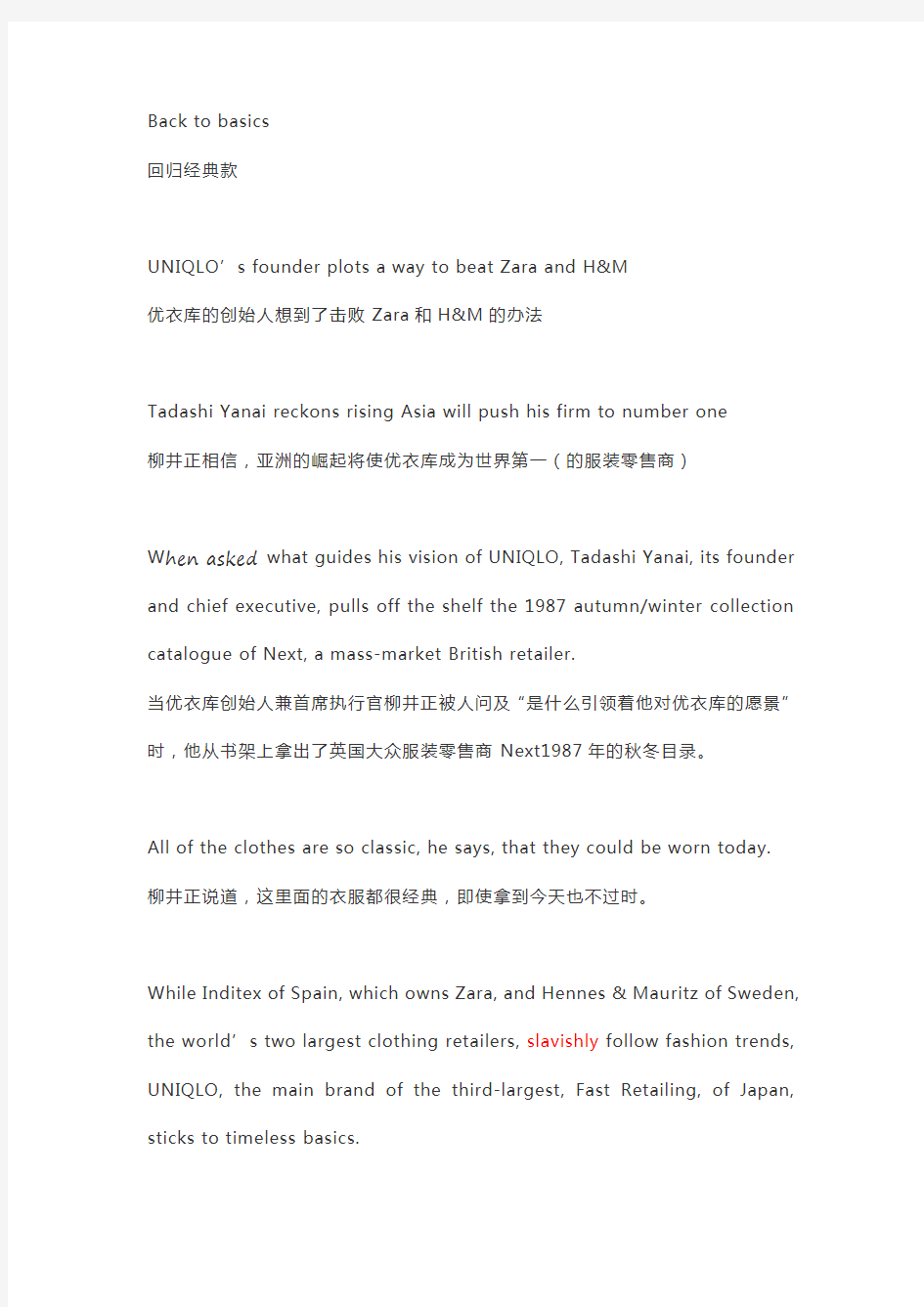2019经济学人考研英文文章阅读六

- 1、下载文档前请自行甄别文档内容的完整性,平台不提供额外的编辑、内容补充、找答案等附加服务。
- 2、"仅部分预览"的文档,不可在线预览部分如存在完整性等问题,可反馈申请退款(可完整预览的文档不适用该条件!)。
- 3、如文档侵犯您的权益,请联系客服反馈,我们会尽快为您处理(人工客服工作时间:9:00-18:30)。
Back to basics
回归经典款
UNIQLO’s founder plots a way to beat Zara and H&M
优衣库的创始人想到了击败Zara和H&M的办法
Tadashi Yanai reckons rising Asia will push his firm to number one
柳井正相信,亚洲的崛起将使优衣库成为世界第一(的服装零售商)
W hen asked what guides his vision of UNIQLO,Tadashi Yanai,its founder and chief executive,pulls off the shelf the1987autumn/winter collection catalogue of Next,a mass-market British retailer.
当优衣库创始人兼首席执行官柳井正被人问及“是什么引领着他对优衣库的愿景”时,他从书架上拿出了英国大众服装零售商Next1987年的秋冬目录。
All of the clothes are so classic,he says,that they could be worn today.
柳井正说道,这里面的衣服都很经典,即使拿到今天也不过时。
While Inditex of Spain,which owns Zara,and Hennes&Mauritz of Sweden, the world’s two largest clothing retailers,slavishly follow fashion trends, UNIQLO,the main brand of the third-largest,Fast Retailing,of Japan, sticks to timeless basics.
世界上最大的两家服装零售商,西班牙的Inditex(拥有服装品牌Zara)和瑞典的Hennes&Mauritz都在盲目地追随时尚潮流,而作为世界上第三大服装零售商的优衣库(日本迅销集团旗下的品牌)则在坚持永恒不变的经典。
Mr Yanai has a solid base at home from which to expand into his Western competitors’main markets of Europe and America.But instead his priority remains Asia.
柳井正在日本国内打下了坚实的基础,从而可以向欧美等西方竞争对手的主要市场扩张。不过,他的重心仍在亚洲。
He wants to turn UNIQLO into the world’s largest clothing retailer by becoming the first Asian“SPA”or speciality store retailer of private-label apparel.
他希望把优衣库发展为亚洲首家服装零售的“SPA”,即自主品牌专业服装零售商,从而把优衣库打造成全球最大的服装零售商。(注:SPA是Specialty retailer of Private label Apparel的缩写,即自有品牌专业零售商经营模式,是一种从商品策划、制造到零售都整合起来的垂直整合型销售形式。)
“Asia is the engine of growth today,”he says,pointing to the millions of consumers across the region who are reaching the middle class.
他表示,亚洲有数百万的消费者正在跨入中产阶级,可以说亚洲是当今全球发展的引擎。
UNIQLO will open its first shop in India this year and is considering whether to expand into Vietnam and other countries(it has already opened networks of shops in Indonesia,Singapore and Thailand).
今年,优衣库将在印度开设第一家门店,并且正在考虑进驻越南以及其他的亚洲国家(优衣库已经在印尼、新加坡和泰国开设了网店)。
UNIQLO has a strong Asian foothold by way of China,home to over half its overseas shops.China contributed around70%of total international revenues last year.
优衣库一半以上的海外门店都在中国,也因此在亚洲站稳了脚跟。去年,优衣库全球总收入的大约70%来自中国。
This success has surprised some,and not only because of ill-feeling towards Japan from many Chinese because of the latter’s wartime record.China is not an easy place to work,and,in clothing at least, Chinese consumers tend to revere brands.
这一成功让一些人感到意外,不仅是因为许多中国人因日本的战时历史而对日本怀有敌意。而且,中国市场也不容易运作,至少在服装方面,中国消费者更崇尚于品牌服装。
But even the label-obsessed need plain bits and bobs for layering or co-ordination.Chinese consumers are after quality,and UNIQLO’s special fabrics,especially its Heattech range for cold weather,function well.
但即使是品牌控也需要一些零七碎八的普通牌子的服装用作铺垫和搭配。中国消费者追求服装的质量,而优衣库的特殊面料(尤其是其针对寒冷天气的发热内衣系列)可谓质量优良。(注:Heattech是优衣库的发热保暖内衣系列)
Above all analysts point to the company’s savvy Japan-educated Chinese executives who understand both the culture of the Japanese business and that of China.
分析人士指出,最重要的是那些在日本受过教育的优衣库中国高管们不仅了解日本的商业文化,还了解中国的商业文化。
But the rest of Asia may be harder to crack.For one thing,a warm climate in several countries means that UNIQLO cannot rely on its cold-weather products as a main driver of sales.
但优衣库在亚洲其他地区可能会举步维艰。一方面,在那几个气候温暖的国家,优衣库不能将其寒冷天气的衣服作为主打销售产品。
It may have to tweak its formula,which could be risky,says Takahiro Saito, a fashion-retail analyst and author of a book comparing UNIQLO and Zara.
